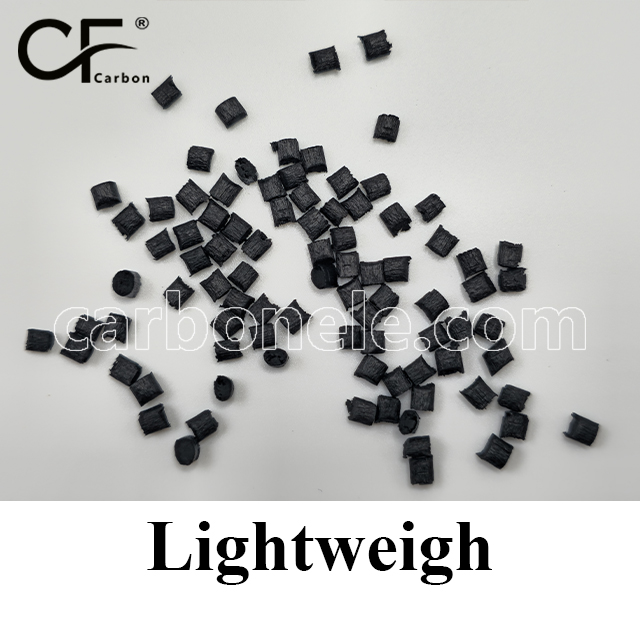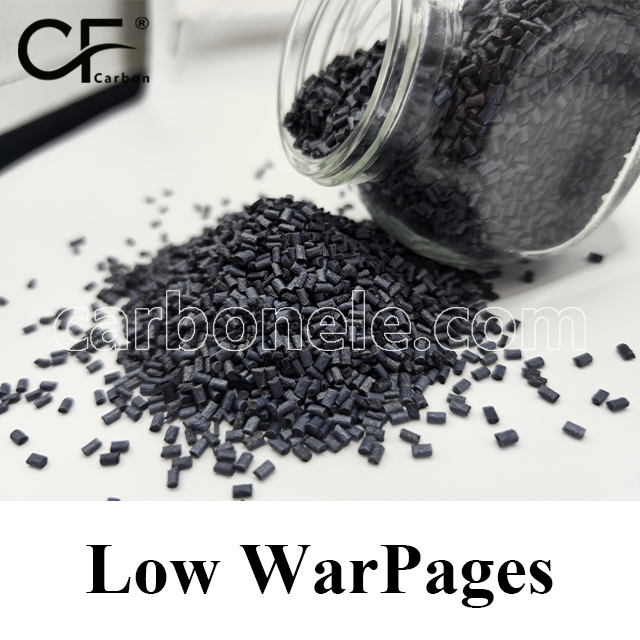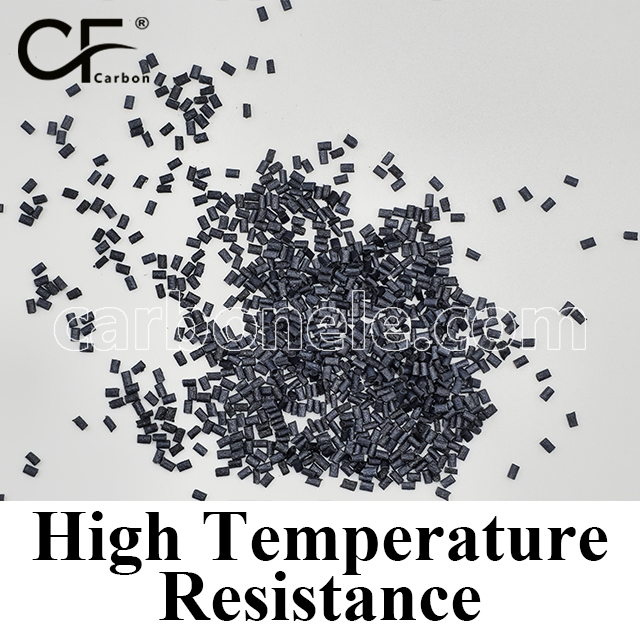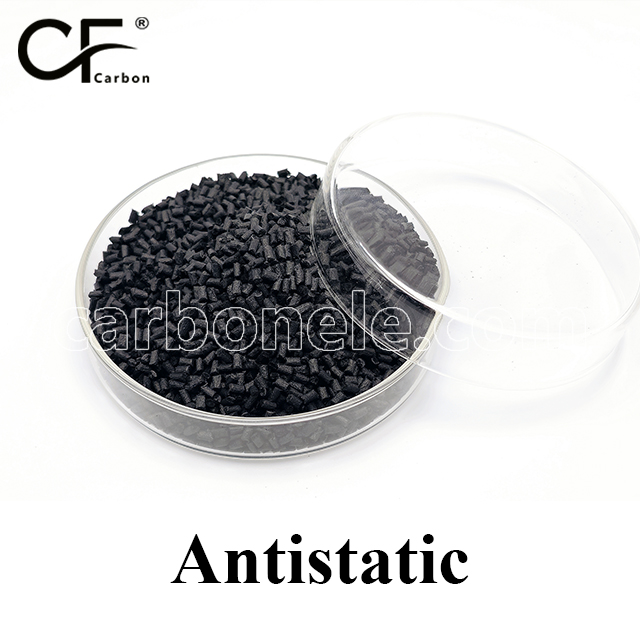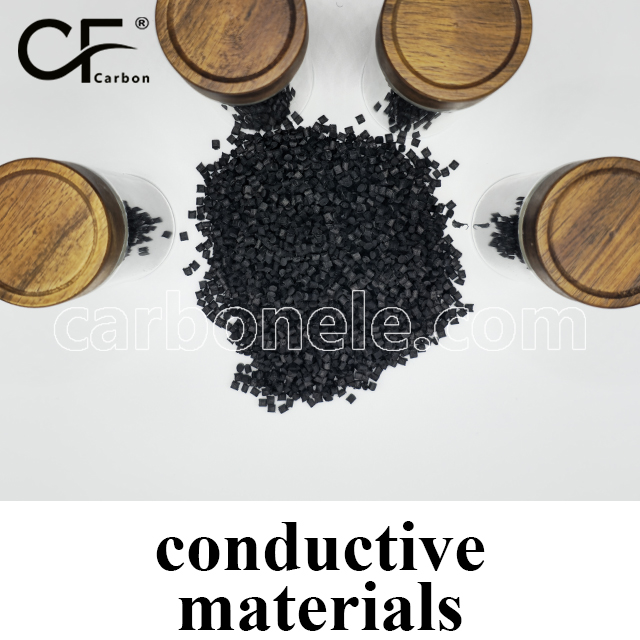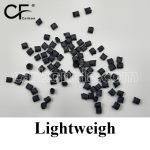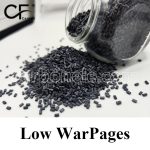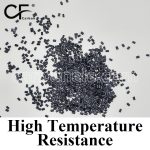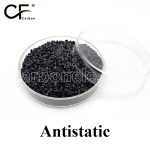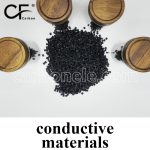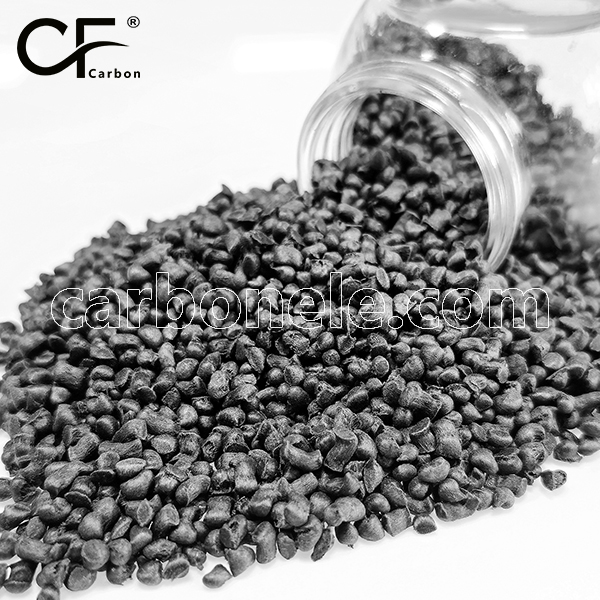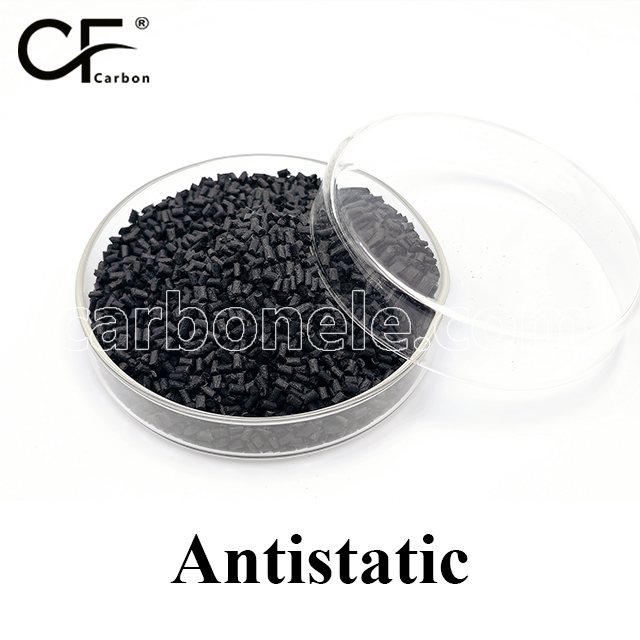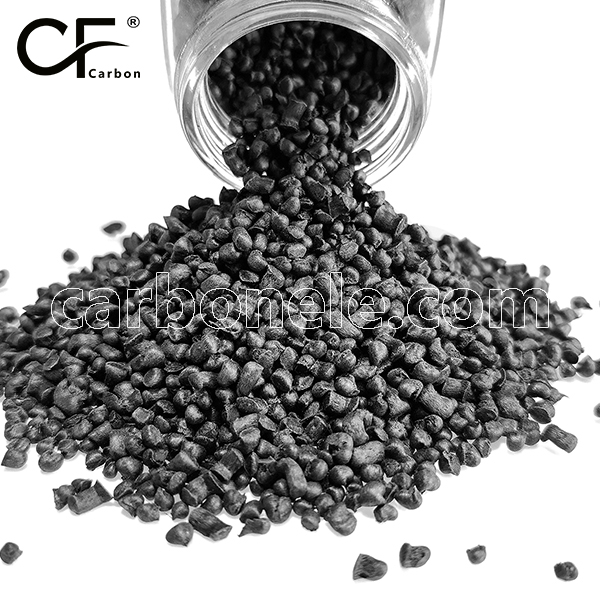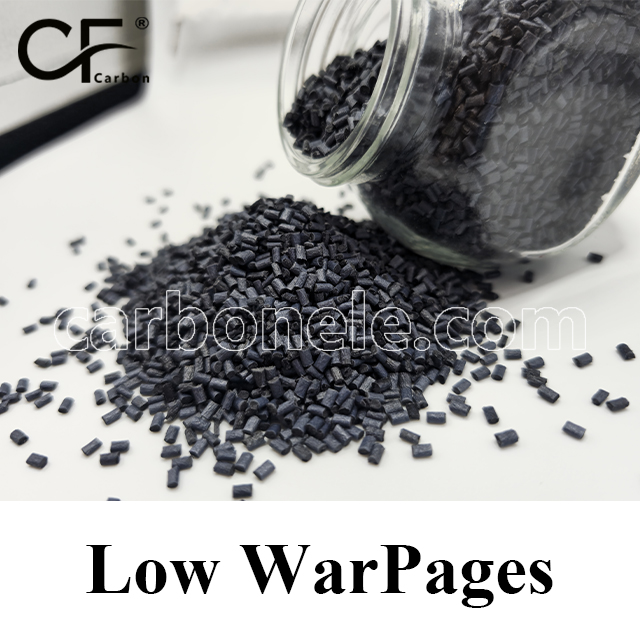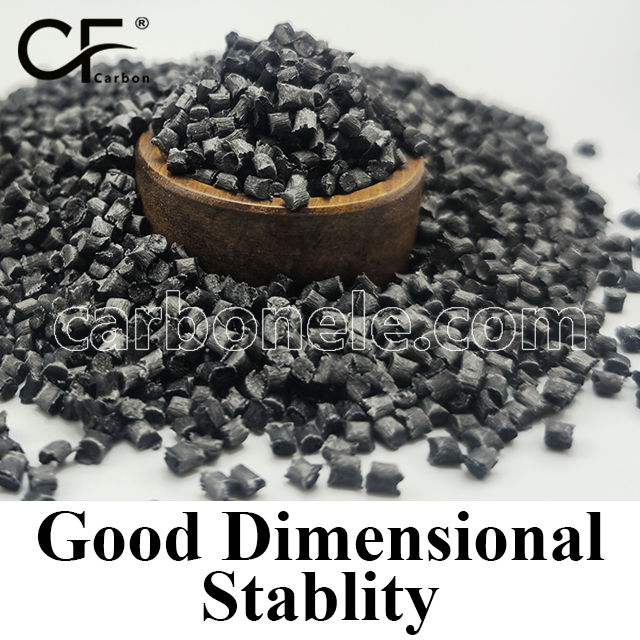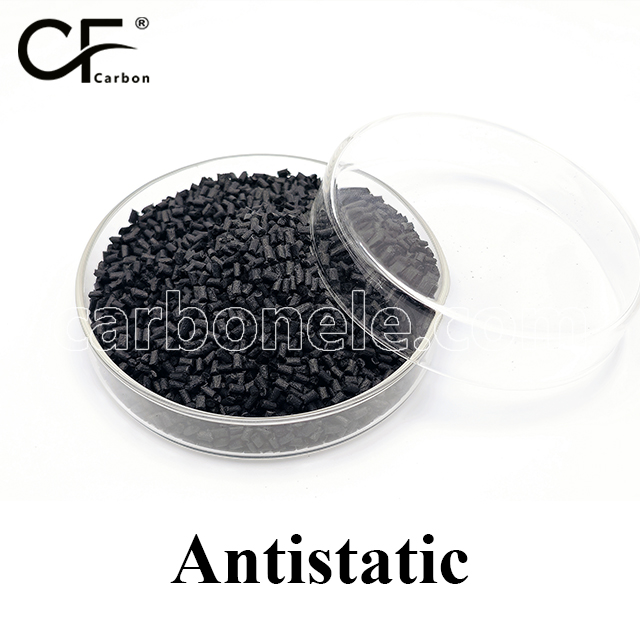TPU-CF60 is an ultra rigid thermoplastic polyurethane composite reinforced with 60% short carbon fiber, offering exceptional stiffness, tensile strength, and thermal resistance—ideal for structural components requiring high mechanical performance, dimensional stability, and chemical durability in demanding environments.

TPU-CF60 for pneumatic and hydraulic tubing
- Model number: TPU-CF-BCA6
- Matrix Resin: Thermoplastic polyurethane (TPU)
- Reinforcing Filler: Carbon fiber
- Appearance: Granules
- Grade: Injection/extrusion grade
- Packaging: 25kgs/bag
TPU-CF60 | 60% Carbon Fiber Reinforced Thermoplastic Polyurethane
TPU-CF60 is a top tier, ultra-stiff structural thermoplastic elastomer that combines the rugged elasticity of TPU with a high 60% short carbon fiber reinforcement. This extreme fiber loading creates a composite with exceptional rigidity, mechanical strength, and dimensional stability—approaching the structural characteristics of some lightweight metals, while retaining just enough flexibility for energy dissipation under dynamic stress.
Designed for advanced applications where maximum stiffness, wear resistance, and thermal stability are required, TPU-CF60 thrives in challenging mechanical environments where conventional flexible materials or lower fiber-content composites fall short. It is especially suitable for hybrid rigid flex components and semi structural parts where impact damping and load bearing strength must coexist.
TPU-CF60 exhibits excellent resistance to chemical attack, moisture absorption, and mechanical fatigue, making it ideal for high frequency industrial systems, robotics, transportation infrastructure, and protective systems in high abuse environments.
Core Performance Highlights
Mechanical Properties
Carbon Fiber Content: 60% (short carbon fiber, tightly packed for maximum stiffness)
Tensile Strength: ≥ 100 MPa
Elongation at Break: ≥ 30%
Shore Hardness: ~98A
→ Optimized for structural strength and rigidity while preserving controlled flexibility to handle vibration, shock, and torsional loads.
Thermal Resistance
Heat Deflection Temperature (HDT): ~135 °C
Continuous Use Temperature: Up to 120 °C
→ Capable of withstanding elevated temperatures and thermal cycling in engine bays, drive systems, and high speed motion assemblies.
Environmental & Chemical Durability
Moisture Absorption: Negligible — ensures stable dimensions and long term mechanical performance even in humid or submerged conditions
Chemical Resistance: Outstanding — resists oils, fuels, industrial solvents, and hydraulic fluids
→ Delivers uncompromised performance in chemically harsh and unpredictable industrial and automotive environments.
Processing & Manufacturing
Molding Methods: Injection molding, extrusion, 3D printing (with high temp capable nozzles and reinforced drive systems)
Surface Finish: Matte and textured — pronounced fiber visibility at this loading level
Tooling Considerations: Requires wear resistant steel molds and elevated injection pressures to ensure fiber alignment and cavity filling
→ Despite its high stiffness, TPU-CF60 remains compatible with modern thermoplastic manufacturing methods when equipment is optimized for fiber filled materials.
Target Applications
Automotive & Mobility Systems
Engine bay structures, high load brackets, thermal isolation zones
→ Replaces aluminum or PA-CF parts where vibration damping and chemical resilience are equally critical.
Industrial Equipment
Rigid isolators, friction intensive guide rails, durable motion control components
→ Resilient under mechanical fatigue, high cycle stress, and exposure to oils or coolants.
Robotics & Automation
Precision arm supports, load resistant skeletons, actuator interface components
→ Enables the design of lightweight yet structurally rigid assemblies for high performance automation.
Tactical & Safety Gear
Rigid exo frames, armored panels, ballistic or impact absorbing shells
→ Delivers advanced protection with reduced weight, high energy dispersion, and exceptional toughness.
Performance Summary Table
| Property | Value / Description |
|---|---|
| Carbon Fiber Content | 60% (Short Carbon Fiber) |
| Tensile Strength | ≥ 100 MPa |
| Elongation at Break | ≥ 30% |
| Shore Hardness | ~98A |
| Heat Deflection Temp. | ~135 °C |
| Long Term Service Temp. | Up to 120 °C |
| Water Absorption | Negligible — dimensionally stable even in submerged conditions |
| Chemical Resistance | Excellent — withstands fuels, oils, greases, solvents |
| Wear Resistance | Ultra high — suitable for extreme load and repetitive motion parts |
| Processing Methods | Injection molding, extrusion, high temperature 3D printing |
| Surface Finish | Matte/textured — carbon visibility enhanced at 60% loading |
| Dimensional Stability | Outstanding — ideal for rigid flex structural hybrids |
If you want to get more information about TPU-CF50, you can vist our Youtube.
Friction coefficient of PA12-LCF
The friction coefficient of TPU is typically between 0.3 and 0.5, while TPU-CF, with added carbon fiber, lowers the friction coefficient to between 0.2 and 0.4. The smaller the value, the better the wear resistance. Therefore, TPU-CF generally offers better wear resistance than pure TPU, especially under high-load conditions.
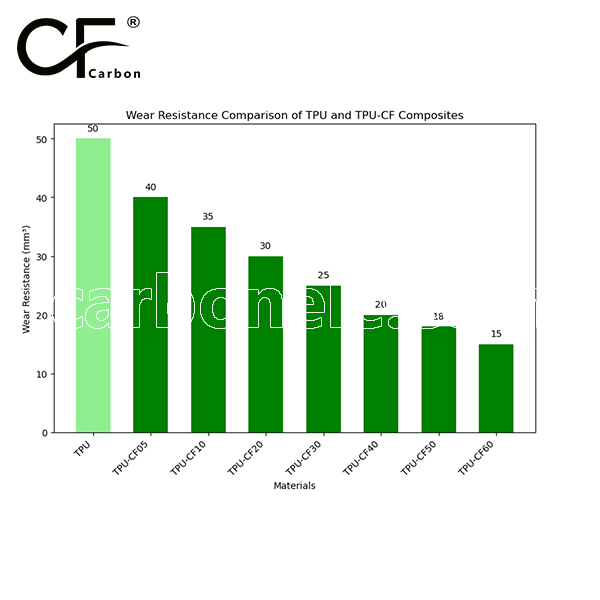
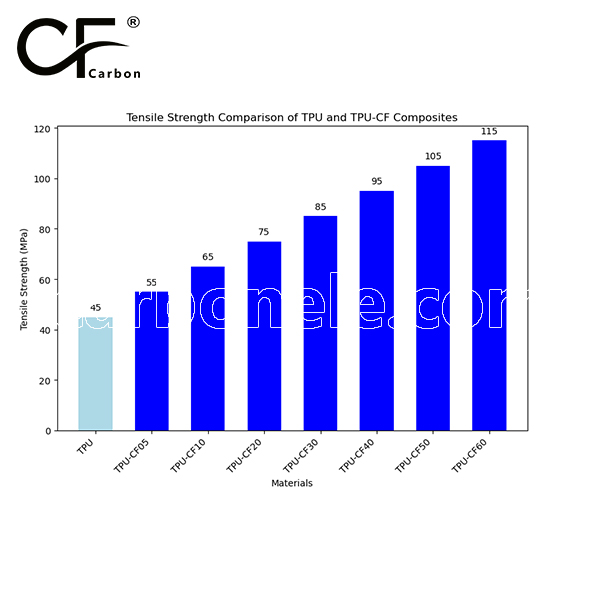

Frequently Asked Questions
Carbon (Xiamen) New Material Co., Ltd. aims to provide buyers with "one-stop" worry-free high-quality services. Here you can find all information about carbon fiber engineering plastics. If you still have questions, please send us an email for consultation!
-
How can I contact the manufacturer of a product that interests me?
When you find a product you are interested in, you can contact the manufacturer directly by sending an email and we will get back to you as soon as possible.
-
How do I find the products that interest me?
All you need to do is enter the keyword, product name in the search window and press the Enter key on your keyboard. Your search results page will then be displayed. You can also search within the product category pages on the home page. Each category is divided into subcategories, allowing you to refine your search and find products that interest you.
-
Where will I find a buying guide?
Please contact our after-sales service directly and we will provide you with a comprehensive operating guide.
-
What are CF Reinforced Thermoplastic Composites?
CF Reinforced Thermoplastic Composites are materials where carbon fibers are incorporated into a thermoplastic matrix. They combine the strength and stiffness of carbon fibers with the processability and recyclability of thermoplastics. For instance, they are used in automotive parts like bumper beams.
-
What are the benefits of CF Reinforced Thermoplastic Composites over traditional composites?
The key benefits include faster production cycles, easier recyclability, and better impact resistance. They also offer design flexibility. An example is in the manufacturing of consumer electronics casings where complex shapes can be achieved more easily.
-
How are CF Reinforced Thermoplastic Composites processed?
Common processing methods include injection molding, extrusion, and compression molding. Injection molding is widely used for mass production. For example, in the production of small components for the medical industry.
-
What industries use CF Reinforced Thermoplastic Composites?
They are utilized in aerospace, automotive, medical, and sports equipment industries. In aerospace, they can be found in interior components. In the medical field, they might be used in prosthetics.
-
How does the carbon fiber content affect the properties of the composites?
Higher carbon fiber content generally leads to increased strength and stiffness but may reduce ductility. A moderate content is often balanced for specific applications. For example, a higher content might be preferred in structural parts of a race car.
-
What are the challenges in using CF Reinforced Thermoplastic Composites?
Challenges include higher material costs, complex processing equipment requirements, and ensuring uniform fiber dispersion. Issues with adhesion between the fibers and the matrix can also arise. An example is in achieving consistent quality in large-scale production.







